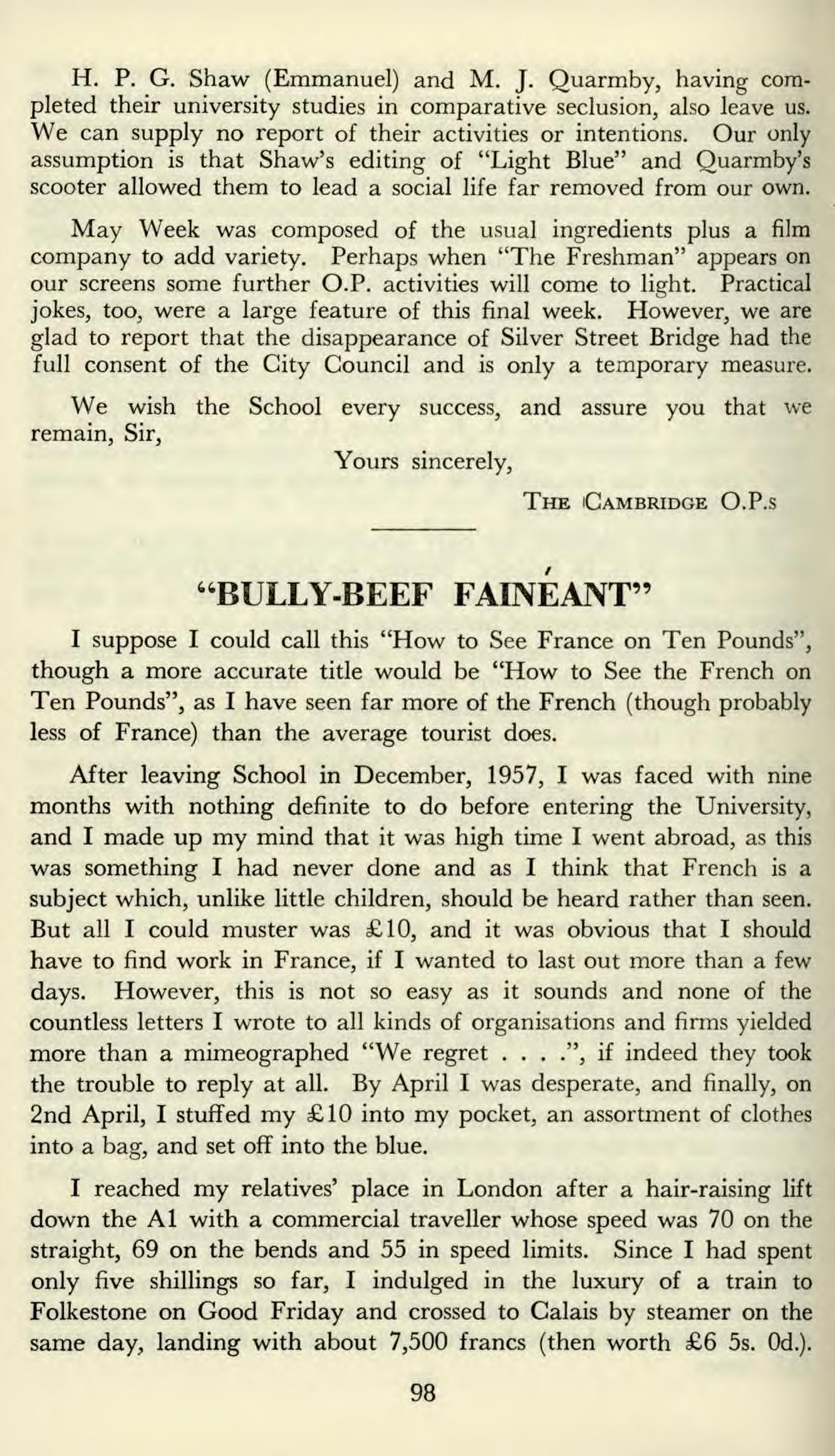
6 minute read
Editorial Notices
from Oct 1958
by StPetersYork
H. P. G. Shaw (Emmanuel) and M. J. Quarmby, having completed their university studies in comparative seclusion, also leave us. We can supply no report of their activities or intentions. Our only assumption is that Shaw's editing of "Light Blue" and Quarmby's scooter allowed them to lead a social life far removed from our own.
May Week was composed of the usual ingredients plus a film company to add variety. Perhaps when "The Freshman" appears on our screens some further O.P. activities will come to light. Practical jokes, too, were a large feature of this final week. However, we are glad to report that the disappearance of Silver Street Bridge had the full consent of the City Council and is only a temporary measure.
We wish the School every success, and assure you that we remain, Sir,
Yours sincerely,
THE CAMBRIDGE O.P.s
I suppose I could call this "How to See France on Ten Pounds", though a more accurate title would be "How to See the French on Ten Pounds", as I have seen far more of the French (though probably less of France) than the average tourist does.
After leaving School in December, 1957, I was faced with nine months with nothing definite to do before entering the University, and I made up my mind that it was high time I went abroad, as this was something I had never done and as I think that French is a subject which, unlike little children, should be heard rather than seen. But all I could muster was £10, and it was obvious that I should have to find work in France, if I wanted to last out more than a few days. However, this is not so easy as it sounds and none of the countless letters I wrote to all kinds of organisations and firms yielded more than a mimeographed "We regret . . . .", if indeed they took the trouble to reply at all. By April I was desperate, and finally, on 2nd April, I stuffed my £10 into my pocket, an assortment of clothes into a bag, and set off into the blue.
I reached my relatives' place in London after a hair-raising lift down the Al with a commercial traveller whose speed was 70 on the straight, 69 on the bends and 55 in speed limits. Since I had spent only five shillings so far, I indulged in the luxury of a train to Folkestone on Good Friday and crossed to Calais by steamer on the same day, landing with about 7,500 francs (then worth £6 5s. Od.).
I spent two nights in a cafe in Calais and roamed around on the Saturday job-hunting. Finding nothing, I set off on Easter Day (with the vague intention of heading for Paris) along the Boulogne Road. But French cars simply don't stop and evening found me in Hesdigneul (a village near Samer). There, where I earned refreshment at a cafe by translating some German letters into French for the "patronne", I was strongly advised to head for Le Touquet instead.
This seemed a good idea, as Le Touquet is a fashionable resort and I had already worked for two months in an English hotel during the holidays the year before, and could therefore claim a certain amount of experience. It seemed an even better idea when I discovered that the train fare from Hesdigneul was a mere 130 francs (2s. 2d.), and at 10 the next morning I was climbing the stairs of Le Touquet's "Syndicat d'HOteliers", a tiny office I had come across by luck rather than judgment.
"Apres la bataille" (it was Easter Monday) was the comment of the Secretary, but she rang one of the bigger hotels all the same, and lo and behold ! I was accepted.
I don't think I need mention all the details of my work; I will just say that I spent the first fortnight helping the chef, a month as night porter and night switchboard operator (the hotel has 70 extensions all running from the same switchboard) and three weeks as waiter. During my two months there I earned 45,000 francs (£37 10s. Od.). This may not seem much, but it came on top of free board and lodging, a total of eight days off, and my tips (as night porter I once got 500 francs (8s. 4d.) for carrying a few cases, although I usually got about 300 (5s.)). I was able to afford to come home by air and rail and I still have enough to return on the 20th June to start as a waiter in a little restaurant on the sea-front.
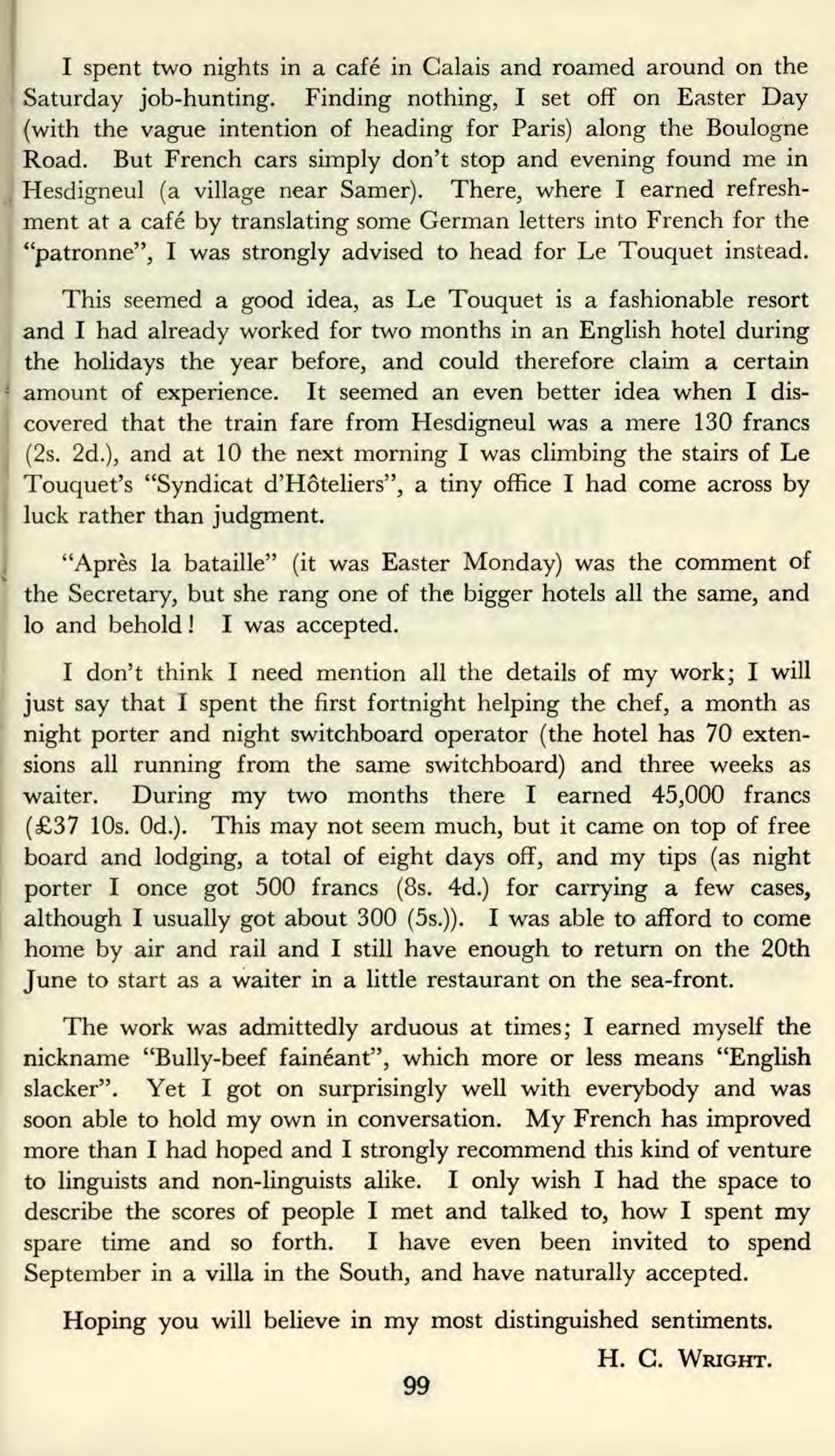
The work was admittedly arduous at times; I earned myself the nickname "Bully-beef faineant", which more or less means "English slacker". Yet I got on surprisingly well with everybody and was soon able to hold my own in conversation. My French has improved more than I had hoped and I strongly recommend this kind of venture to linguists and non-linguists alike. I only wish I had the space to describe the scores of people I met and talked to, how I spent my spare time and so forth. I have even been invited to spend September in a villa in the South, and have naturally accepted.
Hoping you will believe in my most distinguished sentiments.
J. F. W. ADDY (1946-48). It was announced on 30th May that Mr. John Addey was to be the Conservative candidate for the South Leeds division. He will oppose Mr. Hugh Gaitskell, the Leader of the Opposition and Socialist M.P. for the division. At the last General Election Mr. Gaitskell had a majority of 12,016 over his Conservative opponent. There will also be a Liberal candidate at the next election.
S. K. KAZEROONI (Rise, 1929-35) is a Director of the Iranian Oil Refining Company and is also Head of The Personnel Division, which covers employee relations, industrial relations, housing, social services, property protection, training department, personnel services, catering and staff and workers' shops. The Refinery has about 30,000 employees. He would be very pleased to help any O.P.s who visit Iran or who are interested in Oil as a career.
THE JUNIOR SCHOOL
It has been decided to discontinue the Junior School Section in The Peterite, and their own magazine, The Olavite, will in future be published each term instead of annually.
ACKNOWLEDGMENTS
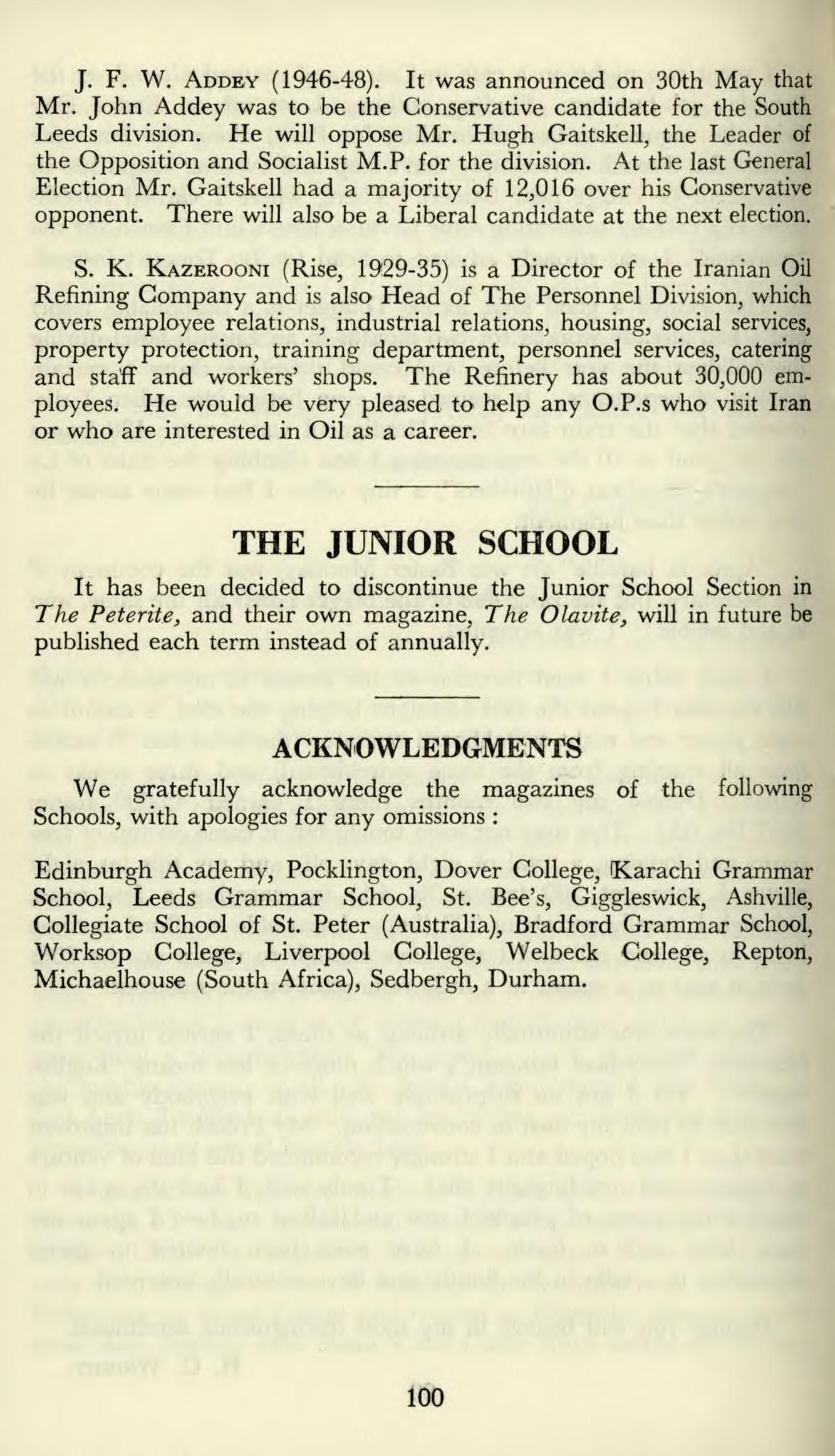
We gratefully acknowledge the magazines of the following Schools, with apologies for any omissions :
Edinburgh Academy, Pocklington, Dover College, Karachi Grammar School, Leeds Grammar School, St. Bee's, Giggleswick, Ashville, Collegiate School of St. Peter (Australia), Bradford Grammar School, Worksop College, Liverpool College, Welbeck College, Repton, Michaelhouse (South Africa), Sedbergh, Durham.
The Peterite is the magazine of St. Peter's School, York. The Editors solicit literary contributions and general correspondence from past and present ∎Peterites. No notice can be taken of anonymous correspondence. Contributors may, if they prefer it, send their name in a separate envelope, which will not be opened unless the contribution is accepted.
Where the contributor's name is not intended for publication, his "nom-de-plume" should be enclosed as well. The subscription to The Peterite is 6s. Od. per annum, payable in advance, i.e., before the issue of the first number of the year (January). Members of the O.P. Club receive The Peterite gratuitously. The Peterite is published three times a year, at the beginning of each term. If any member of the O.P. Club should not receive their numbers of The Peterite, the Editors would be obliged if notice could be sent at once to The Bursar, St. Peter's School, York. The Editors of The Peterite will be glad to supply any past numbers which they may have to those desiring them, at the price of Is. Od. per copy. Applications for advertising space to be made to The Bursar, St.
Peter's School, York.
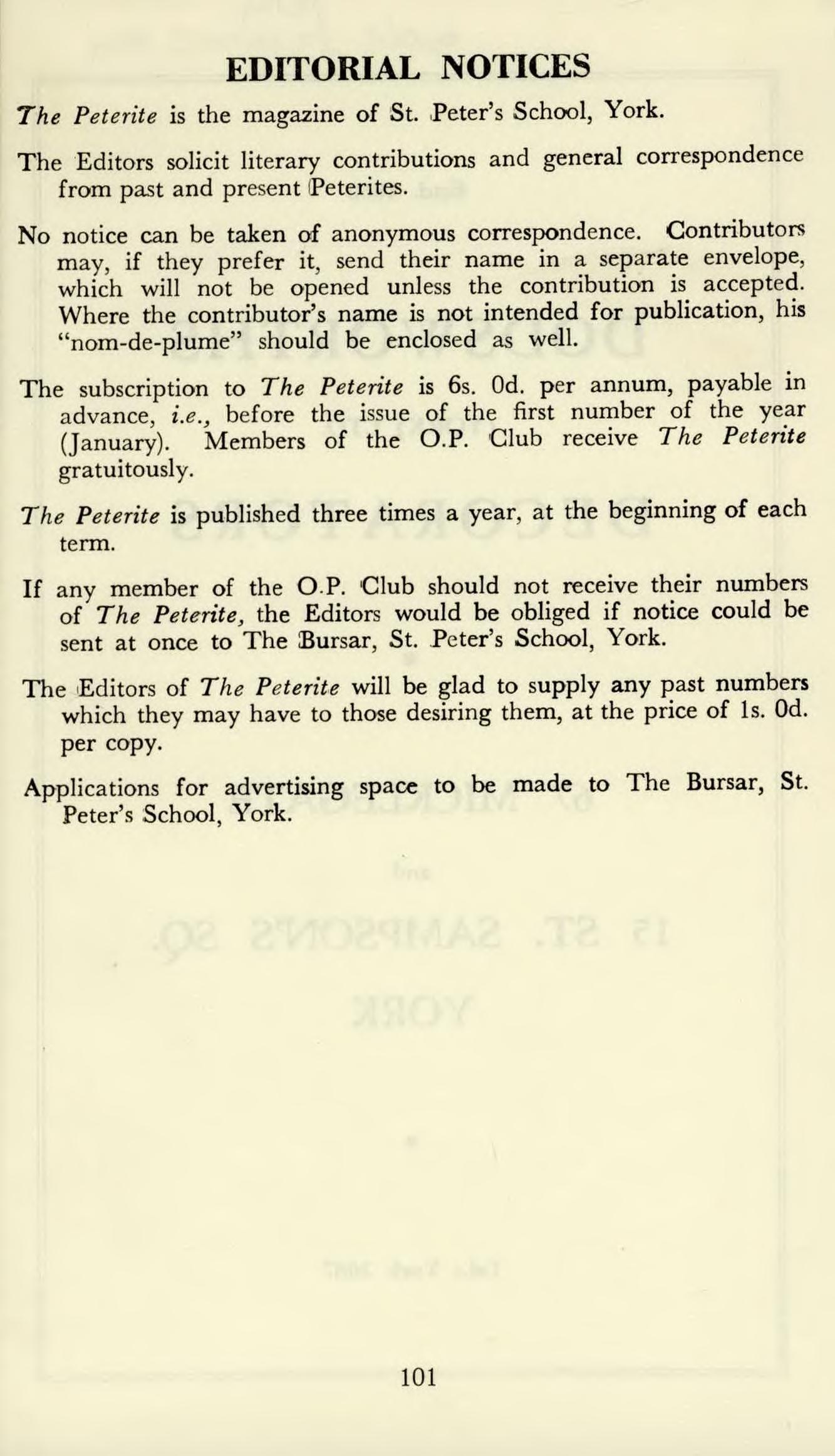
Estd. 1860
DODSWORTHS
( YORK) LTD.
DECORATORS
67 MICKLEGATE
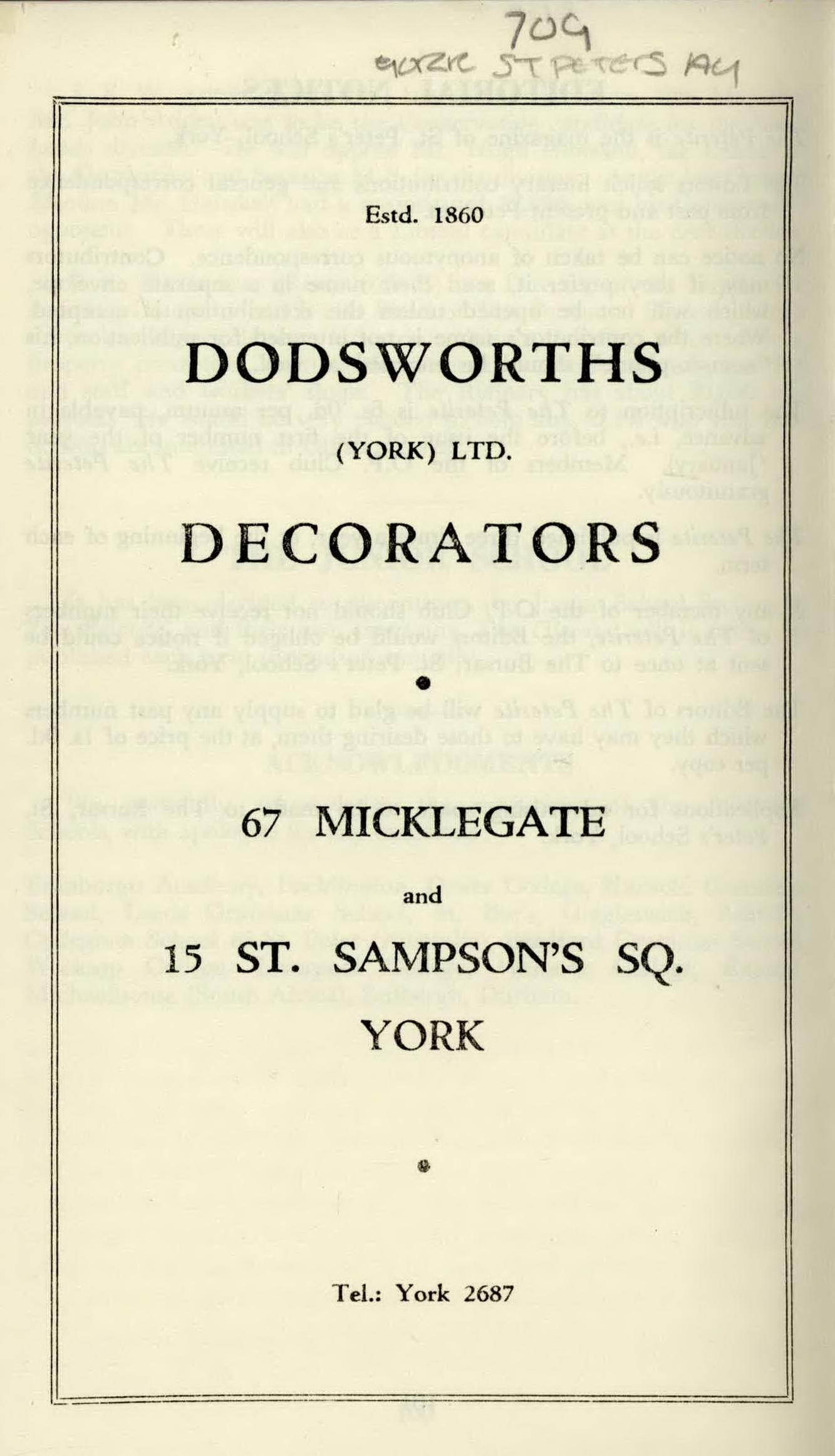
and
15 ST. SAMPSON'S SQ. YORK
Fel.: York 2687










